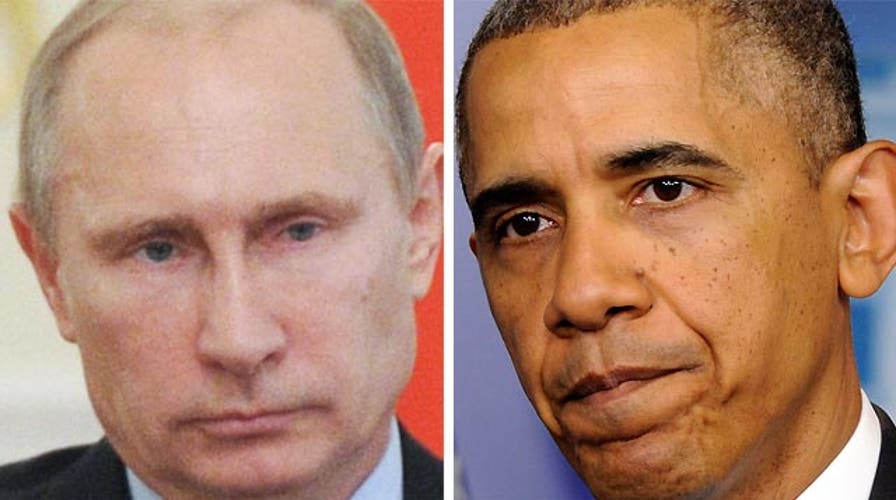This is a rush transcript from "Special Report," August 7, 2014. This copy may not be in its final form and may be updated.
(BEGIN VIDEO CLIP)
MATTHEW ROJANSKY, KENNAN INSTITUTE: From the Russian side, they are making it very clear with this latest round of retaliatory sanctions, hey, they are prepared to endure more pain. Whatever we are going to throw at them in terms of economic sanctions, they will take it and they'll keep on ticking. They are not going to roll over and surrender in Ukraine.
PRESIDENT BARACK OBAMA: The sooner that President Putin realizes that Ukraine is an independent country, you know, it's only at that point we can see the problem has truly been solved. But in the meantime, the sanctions are working the way they are supposed to. Now, if you start seeing an invasion by Russia, that's obviously a different set of questions. We are not there yet.
(END VIDEO CLIP)
BRET BAIER, ANCHOR: There are 20,000 Russian troops on the Ukrainian border right now. And now Russia has pushed back with retaliatory actions, banning imports, food, and other items from the U.S. and EU into Moscow. We're back with panel. George, what about this?
GEORGE WILL, SYNDICATED COLUMNIST: The question is, what is Putin going to do? And the short answer is whatever he wants to do, because there's no credible military force. And the idea that great powers are going to turn on a dime and reverse their course because of sanctions on chickens and things is preposterous. There's no precedent for that in history.
Notice the word that never gets spoken now -- it's Crimea. He got away with it. He has pocketed it. When the president said the crucial thing is for Mr. Putin to recognize that Ukraine is another kind of country means Ukraine is a portion of an independent country, another portion having been swallowed by a man who will swallow whatever else he wants.
BAIER: Crimea, February 28 the president in a statement said "Indeed the United States will stand with the international community in affirming that there will be costs for any military intervention in Ukraine." The question is what those costs have been.
RON FOURNIER, SENIOR POLITICAL COLUMNIST, NATIONAL JOURNAL: Nothing. You heard the president just now say that as soon as we have an invasion, that will be a different matter. As George says, there's been an invasion. He's got Crimea. The sanctions have been too little, too late, too soft. And not only do we not have Putin worried about the president, he's not even been given reason to even have any pause about what the president will do.
BAIER: Is this a done deal? Is it just going to continue like this, or do you think it changes?
CHARLES KRAUTHAMMER, SYNDICATED COLUMNIST: The only thing that will change is Putin will calculate the forces on the ground. He doesn't care about Obama or the United States or the West, or the EU, or the chickens. What he cares about does he has enough proxies in the Eastern Ukraine who are now actually on the losing end of a one-on-one with the Ukrainian army. Has he got enough strength to support them indirectly, or does he have to invade? And if he wants to, he will.
BAIER: I want to ask about the ceasefire. It's coming to an end in about six hours, seven hours, Israel and Hamas. Take a look at The Wall Street Journal, this quote about this latest deal. "When a tentative deal finally came together in Cairo to stop the fighting, Washington found itself outside looking in on the Israeli-Egyptian partnership. Once again, the Obama administration knew from Palestinian contacts earlier in the week that representatives of Israel, Egypt, and the Palestinians were working on a new ceasefire proposal but didn't know details because they were left largely out of discussions. Key Americans said they first heard about the breakthrough from Twitter and the media rather than from their Israeli and Egyptian counterparts."
KRAUTHAMMER: The reason that occurred is that Obama and Kerry had dealt themselves out of any -- working out of a ceasefire. The reason is the one that was approved 72 hours ago was the same one Egypt had offered three weeks earlier. Israel accepted. Egypt had negotiated it and proposed it. The Palestinian Authority accepted it, Saudi Arabia praised it.
Instead of supporting it and saying here is where we stand with our allies in the region, all of whom, including the Arab League, had lined up, Kerry goes off to Paris and negotiates with Hamas' lawyers, Qatar and Turkey, and works out an agreement that really hands Hamas everything it wanted. At that point the moderate Arabs and the Israeli's said, this is not helpful. We are going to have to return to the Egyptian proposal, which is what happened three weeks later. And as a result it was negotiated among the parties with Obama and Kerry left out because they had botched it the first time around.
BAIER: So far, this has held. We'll see what happens in six hours. That is it for the panel, but stay tuned for some helpful parenting advice.
Content and Programming Copyright 2014 Fox News Network, LLC. ALL RIGHTS RESERVED. Copyright 2014 CQ-Roll Call, Inc. All materials herein are protected by United States copyright law and may not be reproduced, distributed, transmitted, displayed, published or broadcast without the prior written permission of CQ-Roll Call. You may not alter or remove any trademark, copyright or other notice from copies of the content.

